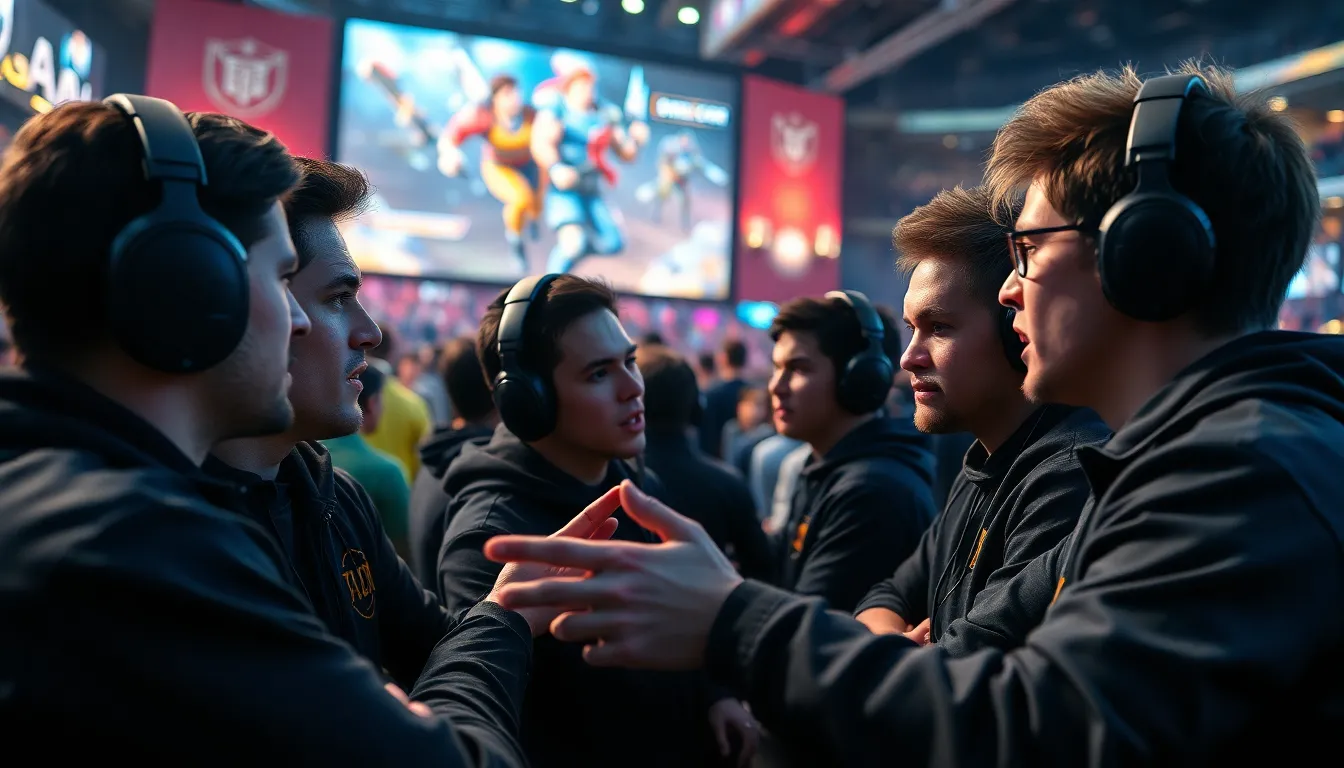In the high-octane world of esports, where every pixel matters and rivalries ignite faster than a speedrun, drama is the secret sauce that keeps fans glued to their screens. From shocking betrayals to unexpected alliances, the stories that unfold behind the scenes often rival the games themselves. Who knew that a simple tweet could spark a full-blown digital war?
Table of Contents
ToggleOverview of Esports Drama Reports
Esports drama reports cover conflicts, rivalries, and controversies that define the competitive gaming landscape. The narratives behind these incidents often draw as much attention as the tournaments themselves. They illustrate the human aspect of esports, revealing how personal relationships impact performance and fan engagement.
Fans follow the developments closely, finding excitement in stories like player feuds or team betrayals. For example, a single tweet can spark a firestorm, leading to public discussions and heated confrontations. Events such as player transfers or disputes over contracts frequently become focal points in the media.
Each report serves to analyze the dynamics between players and organizations, highlighting shifts in loyalties and the implications these have on gaming careers. Rivalries, whether friendly or hostile, entice viewers and enhance the competitive atmosphere. These narratives contribute to the overall entertainment value of esports.
Media outlets dive deep into these stories, offering varying perspectives and insights. Esports dramas not only captivate fans but also impact players’ reputations and marketability. The reactions from fans and stakeholders can vary widely, creating a vibrant discussion around each incident.
Engagement in the community revolves around these dramas, further supporting the ecosystem of competitive gaming. Players and organizations navigate this landscape, knowing public perception affects their standing. The connection between drama and viewership remains evident as passion for the sport grows.
Recent Notable Esports Scandals

Esports continues to experience a series of scandals that capture widespread attention. Significant events often involve team conflicts and player disputes, along with management issues and controversies.
Team Conflicts and Player Disputes
Player rivalries frequently escalate into public disputes, highlighting the competitive nature of esports. Controversies such as these often arise from disagreements over gameplay strategies or personal grievances. Notable incidents include clashes between team members during high-stakes tournaments, where tensions can lead to player exits or significant roster changes. For example, recent disputes among top teams garnered immense media coverage, affecting team chemistry and fan loyalty. These events not only impact player relationships but also influence the overall dynamics within the esports community.
Management Issues and Controversies
Management controversies in esports organizations often complicate player experiences and team dynamics. Issues such as contract disputes, miscommunication, and financial mismanagement emerge regularly. High-profile resignations and firings frequently make headlines, revealing underlying tensions within organizations. For instance, allegations of unethical practices in player management prompted investigations that attracted significant scrutiny. These management challenges directly affect team performance, collaboration, and public perception, underscoring how crucial effective leadership is in the competitive gaming landscape.
Impact on the Esports Community
Esports drama significantly influences the dynamics within the esports community, fueling fan engagement and affecting player trajectories.
Fan Reactions and Engagement
Fans often react passionately to drama reports, shaping conversations around teams and players. Social media serves as a platform where supporters discuss conflicts, fueling excitement among followers. High tensions from player rivalries engage audiences, drawing larger viewership during streams and tournaments. A single incident can spark discussions, leading to trending topics that capture the community’s attention. Fans’ emotional investments in players’ stories enhance loyalty, with many choosing sides amid conflicts. The thrill of following drama creates an ongoing dialogue, uniting fans in shared experiences and opinions.
Effects on Player Careers
Player careers can experience dramatic shifts due to controversies and rivalries. Players involved in disputes might face challenges in team dynamics, affecting their performance on and off the field. Additionally, media portrayal of these events can shape public perception, influencing sponsorship and recruitment opportunities. Those who manage to navigate drama successfully may establish stronger fanbases, while others struggle to recover from reputational damage. Career trajectories often depend on the ability to adapt and respond to controversies. Ultimately, the esports environment makes navigating personal and professional relationships crucial for sustaining long-term success.
Media Coverage and Reporting Styles
Media coverage of esports drama varies significantly, reflecting different reporting styles across platforms. Traditional media typically emphasizes in-depth analysis and editorial perspectives. These outlets focus on the impact of conflicts on teams and players, offering context that shapes audience understanding.
Online media often prioritizes speed and engagement. News articles and blog posts quickly report breaking drama, frequently emphasizing sensational elements. This style appeals to fans seeking immediate updates and reactions, fostering real-time discussions among the community.
Differences Between Traditional and Online Media
Traditional media outlets provide comprehensive coverage and deeper reporting. These platforms often include expert analysis that examines the nuances of player relationships and organizational dynamics. Online media, however, favors rapid reporting and rapid dissemination of information. This approach attracts clicks and shares, effectively harnessing fan interest in current conflicts.
Journalism in traditional settings relies on established editorial standards and verification processes. Conversely, online reporting may prioritize sensational headlines, sometimes leading to misinformation. Understanding these differences equips fans to navigate the complex landscape of esports drama.
The Role of Social Media in Drama Reporting
Social media plays a pivotal role in the dissemination of esports drama updates. Platforms like Twitter and Reddit serve as primary channels for real-time interaction. Fans quickly share opinions and reactions, significantly elevating the drama’s visibility.
Players also utilize social media to communicate directly with fans. This direct engagement often shapes narratives and influences public perception significantly. As discussions unfold online, they can spiral rapidly, creating waves that affect fan loyalties and player reputations.
Influencers and streamers contribute to the drama by sharing their insights and reactions. Their commentary amplifies issues and often ignites further conversations among the community. The dynamic environment fueled by social media showcases the integral relationship between player stories and fan engagement in esports.
Esports drama reports play a crucial role in shaping the competitive gaming landscape. The personal stories behind rivalries and conflicts not only captivate fans but also influence player careers and team dynamics. As the community engages with these narratives the emotional investment in players and teams deepens.
Media coverage varies widely from traditional outlets offering in-depth analysis to online platforms focusing on speed. This diversity in reporting highlights the importance of accurate information in maintaining public perception. Ultimately the intertwining of drama and esports enriches the viewing experience and fuels the passion of fans worldwide.



